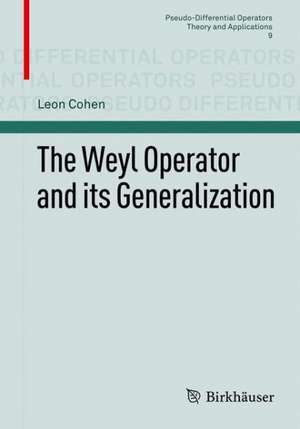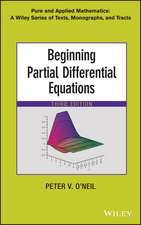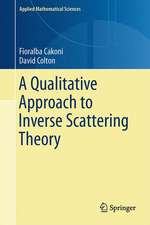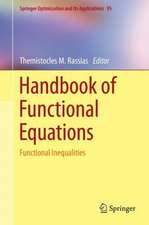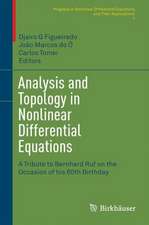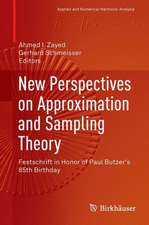The Weyl Operator and its Generalization: Pseudo-Differential Operators, cartea 9
Autor Leon Cohenen Limba Engleză Paperback – 12 dec 2012
This book aims at bringing together the results from the above mentioned fields in a unified manner and showing the reader how the methods have been applied. A wide audience is addressed, particularly students and researchers who want to obtain an up-to-date working knowledge of the field. The mathematics is accessible to the uninitiated reader and is presented in a straightforward manner.
Preț: 382.95 lei
Nou
Puncte Express: 574
Preț estimativ în valută:
73.28€ • 76.66$ • 60.87£
73.28€ • 76.66$ • 60.87£
Carte tipărită la comandă
Livrare economică 03-17 aprilie
Preluare comenzi: 021 569.72.76
Specificații
ISBN-13: 9783034802932
ISBN-10: 3034802935
Pagini: 159
Ilustrații: XII, 159 p.
Dimensiuni: 168 x 240 x 15 mm
Greutate: 0.3 kg
Ediția:2012
Editura: Springer
Colecția Birkhäuser
Seria Pseudo-Differential Operators
Locul publicării:Basel, Switzerland
ISBN-10: 3034802935
Pagini: 159
Ilustrații: XII, 159 p.
Dimensiuni: 168 x 240 x 15 mm
Greutate: 0.3 kg
Ediția:2012
Editura: Springer
Colecția Birkhäuser
Seria Pseudo-Differential Operators
Locul publicării:Basel, Switzerland
Public țintă
ResearchCuprins
Introduction.- The Fundamental Idea, Terminology, and Operator Algebra.- The Weyl Operator.- The Algebra of the Weyl Operator.- Product of Operators, Commutators, and the Moyal Sin Bracket.- Some Other Ordering Rules.- Generalized Operator Association.- The Fourier, Monomial, and Delta Function Associations.- Transformation Between Associations.- Path Integral Approach.- The Distribution of a Symbol and Operator.- The Uncertainty Principle.- Phase-Space Distributions.- Amplitude, Phase, Instantaneous Frequency, and the Hilbert Transform.- Time - Frequency Analysis.- The Transformation of Differential Equations into Phase Space.- The Representation of Functions.- The N Operator Case.
Textul de pe ultima copertă
This book deals with the theory and application of associating a function of two variables with a function of two operators that do not commute.
The concept of associating ordinary functions with operators has arisen in many areas of science and mathematics, and up to the beginning of the twentieth century many isolated results were obtained. These developments were mostly based on associating a function of one variable with one operator, the operator generally being the differentiation operator. With the discovery of quantum mechanics in the years 1925-1930, there arose, in a natural way, the issue that one has to associate a function of two variables with a function of two operators that do not commute. Methods to do so became known as rules of association, correspondence rules, or ordering rules. This has led to a wonderfully rich mathematical development that has found applications in many fields. Subsequently it was realized that for every correspondence rule there is a corresponding phase-space distribution. Now the fields of correspondence rules and phase-space distributions are intimately connected. A similar development occurred in the field of time-frequency analysis where the aim is to understand signals with changing frequencies.
The Weyl Operator and Its Generalization aims at bringing together the basic results of the field in a unified manner. A wide audience is addressed, particularly students and researchers who want to obtain an up-to-date working knowledge of the field. The mathematics is accessible to the uninitiated reader and is presented in a straightforward manner.
The concept of associating ordinary functions with operators has arisen in many areas of science and mathematics, and up to the beginning of the twentieth century many isolated results were obtained. These developments were mostly based on associating a function of one variable with one operator, the operator generally being the differentiation operator. With the discovery of quantum mechanics in the years 1925-1930, there arose, in a natural way, the issue that one has to associate a function of two variables with a function of two operators that do not commute. Methods to do so became known as rules of association, correspondence rules, or ordering rules. This has led to a wonderfully rich mathematical development that has found applications in many fields. Subsequently it was realized that for every correspondence rule there is a corresponding phase-space distribution. Now the fields of correspondence rules and phase-space distributions are intimately connected. A similar development occurred in the field of time-frequency analysis where the aim is to understand signals with changing frequencies.
The Weyl Operator and Its Generalization aims at bringing together the basic results of the field in a unified manner. A wide audience is addressed, particularly students and researchers who want to obtain an up-to-date working knowledge of the field. The mathematics is accessible to the uninitiated reader and is presented in a straightforward manner.
Caracteristici
Numerous examples are worked, out illustrating each result The applications to various fields are discussed in elementary fashion The methods are extended to operators other than the standard ones Includes supplementary material: sn.pub/extras
